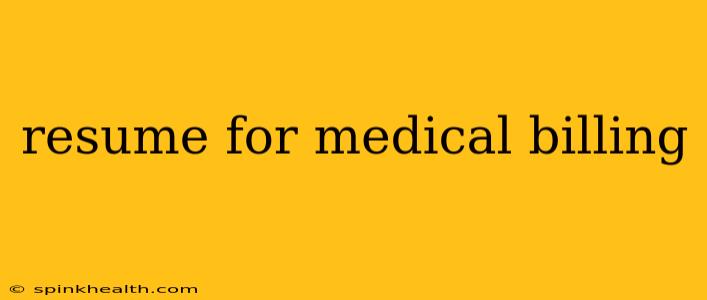Crafting a Winning Resume for a Medical Billing Career: A Story of Skill and Success
Landing that dream medical billing job requires more than just listing your skills; it needs a compelling narrative showcasing your expertise and passion. This isn't just about creating a resume; it's about crafting a story that resonates with hiring managers, highlighting your unique value and making you stand out from the crowd. Let's build that story together.
My Journey into Medical Billing:
Before diving into the specifics, let's address a crucial question: What makes your experience stand out? Did you start with an entry-level position and climb the ladder? Did you transition from a different field, bringing transferable skills? Every journey is unique, and your resume needs to reflect that. Think about the key moments that shaped your career path and the skills you honed along the way. This forms the foundation of your compelling narrative.
Essential Sections: Building Your Story Brick by Brick
1. Contact Information: The First Impression
This section is straightforward. Include your full name, phone number, email address, and LinkedIn profile URL (if applicable). Keep it clean and professional – think of it as the title of your story, setting the stage for what's to come.
2. Summary/Objective: The Hook
This is your elevator pitch – a concise overview of your skills and experience, tailored to each specific job application. For experienced professionals, a summary highlighting key accomplishments and strengths is ideal. For entry-level candidates, a compelling objective statement outlining career goals and relevant skills is more effective.
-
Example Summary: Highly motivated and detail-oriented Medical Biller with 5+ years of experience in processing claims, managing accounts receivable, and ensuring timely reimbursements. Proven ability to improve efficiency and reduce denials through meticulous coding and accurate data entry.
-
Example Objective: Recent graduate seeking an entry-level Medical Billing position. Possesses strong knowledge of medical terminology, coding guidelines (CPT, HCPCS, ICD-10), and claims submission processes. Eager to contribute to a dynamic healthcare team and learn from experienced professionals.
3. Skills: The Tools of the Trade
This section showcases your technical abilities. Categorize your skills for better readability. Here are some key areas to highlight:
- Software Proficiency: List specific billing software (e.g., EPIC, Cerner, Meditech, Practice Management Software) along with your proficiency level (proficient, intermediate, basic).
- Coding Expertise: Mention your knowledge of CPT, HCPCS, and ICD-10 coding systems. Highlight any certifications or specializations (e.g., CPC, CCS-P).
- Claims Processing: Specify your experience with insurance claim submissions, follow-up, and appeals.
- Data Entry and Management: Emphasize your accuracy and efficiency in handling patient data, financial records, and other administrative tasks.
- Communication & Teamwork: Effective communication with patients, physicians, and insurance companies is crucial. Highlight your teamwork abilities.
4. Experience: The Chapters of Your Career
This is the heart of your resume. Don't just list your responsibilities; quantify your accomplishments using the STAR method (Situation, Task, Action, Result).
- Example: Reduced claim denials by 15% within six months by implementing a new pre-billing audit system and improving communication with insurance providers. This resulted in a $10,000 increase in monthly reimbursements.
5. Education: The Foundation of Your Knowledge
List your degrees, certifications, and relevant coursework. Include the name of the institution, degree earned, and graduation date (or expected graduation date). If relevant, mention any relevant coursework, like medical terminology or health information management.
6. Additional Sections (Optional):
- Awards and Recognition: Highlight any achievements or awards relevant to the position.
- Volunteer Experience: Showcase community involvement related to healthcare.
- Professional Development: Include any relevant conferences, workshops, or continuing education courses attended.
Frequently Asked Questions (PAAs): Addressing Common Concerns
Q: What is the best format for a medical billing resume? A chronological format is generally preferred, showcasing your career progression. However, a functional or combination format might be suitable if you're changing careers or have gaps in your employment history.
Q: How long should my resume be? Aim for one page, especially if you're early in your career. For experienced professionals, two pages might be acceptable, but focus on concise, impactful writing.
Q: What keywords should I include? Focus on keywords related to medical billing, coding, software, and insurance claims processing. Tailor these keywords to each specific job description.
Q: How can I make my resume stand out? Use action verbs, quantify your accomplishments, and tailor your resume to each specific job application. Showcase your unique skills and personality while maintaining a professional tone.
Q: What if I lack experience? Focus on your education, skills, and any relevant volunteer experience. Highlight transferable skills from other fields and demonstrate your eagerness to learn.
By weaving together these elements, you'll create a resume that's not just a list of qualifications, but a compelling narrative of your journey, showcasing your skills and highlighting your potential as a valuable asset to any medical billing team. Remember, this is your story – tell it well!

